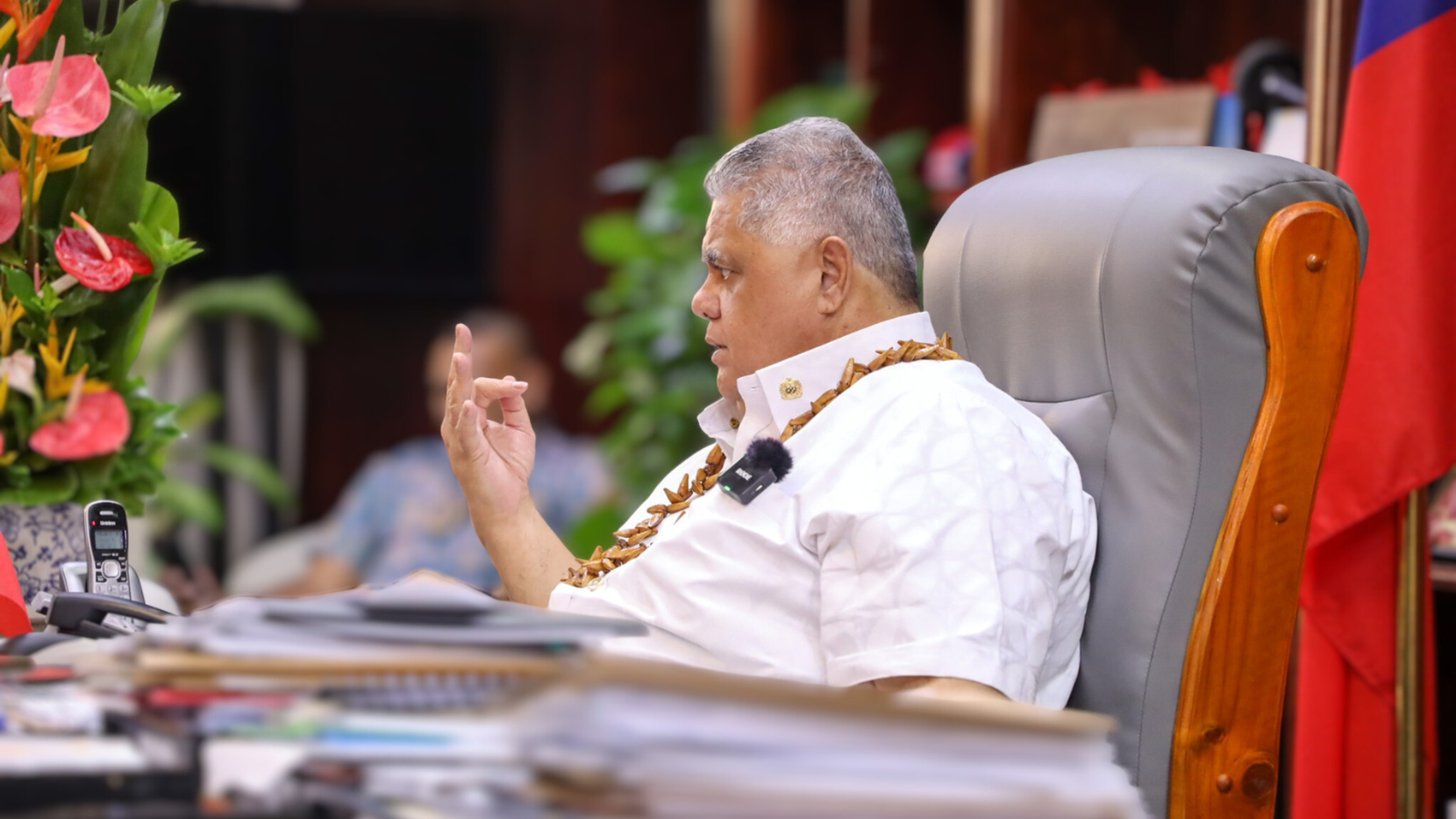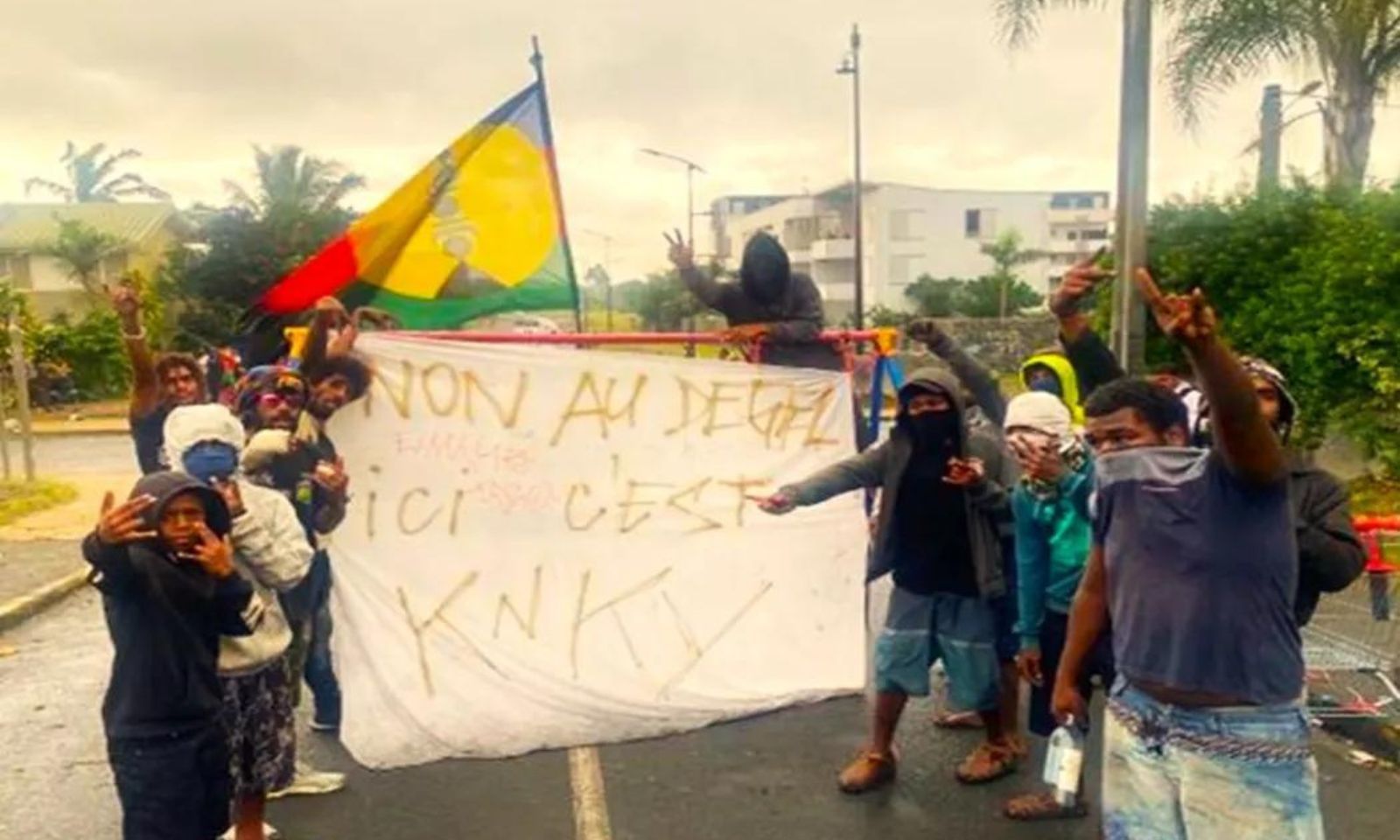

Kanak flags lifted high at pro-independence rally in Nouméa, the capital and largest city of the French special collectivity of New Caledonia.
Photo/RNZ Pacific/Lydia Lewis
‘It’s not great news for New Caledonia'
International relations expert Geoffrey Miller says President Emmanuel Macron’s surprise snap election could see the far-right National Rally party tighten its grip on France’s Pacific territory.


From Kelston to Canterbury: Pasifika engineering student awarded scholarship

Cook Islands tax data show $39m tourism growth to $317m

From South Auckland to Waratahs: Family drives Moananu’s Super Rugby journey

Sāmoa Prime Minister’s conspiracy case ruling postponed again

From Kelston to Canterbury: Pasifika engineering student awarded scholarship

Cook Islands tax data show $39m tourism growth to $317m

From South Auckland to Waratahs: Family drives Moananu’s Super Rugby journey
The significance of fresh French legislative elections called by President Emmanuel Macron will effectively further delay the electoral reform in New Caledonia, an international relations analyst said.
But Geoffrey Miller said it was not going to be great news for New Caledonia's pro-independence movement and the Indigenous Kanak people, in the longer term.
Macron called the snap election this week after a stinging European Parliament vote defeat by his rival, the far-right National Rally (RN) party led by Marine Le Pen and young leader Jordan Bardella. The president’s centrist party, Renaissance, polled less than 15 per cent of the vote on Monday (NZ time) while the anti-immigration National Rally secured more than 31 per cent.
“If the National Rally does very well, this is Le Pen's party in the Legislative elections, I think she's going to harden France's grip on the territory, on New Caledonia. She tweeted back in 2017, ‘New Caledonia is France’,” Miller told Pacific Mornings’ William Terite.
“So I think that probably tells you most of what you need to know about what her general opinion of the situation will be. I think it will be a hardened military solution.
“And Macron's position himself, I mean, he's more of a centrist, was that look the referendum’s being held. There was a vote to stay with France. It’s been decided, live with it.”
The Noumēa Accord, signed by the French government in May 1998, promised to increase political power to New Caledonia and the Kanaks over a 20-year transition period.
But pro-independence leaders said France continued to control the territory's military and foreign policy, immigration, police, and currency.
A referendum held in December 2021 - the third and final vote under the Noumēa Accord - rejected self-rule by 96 per cent (compared to 57 per cent and 53 per cent against independence in 2018 and 2020). The 2021 vote was boycotted by the Kanaks, who had called for the elections to be postponed due to the Covid-19 pandemic.
The French government proposed to parliament last month to allow more voting rights to people who had moved from Paris to Noumēa in the last 10 years.
Macron announced two weeks ago that he would delay the electoral reform following the deadly riots in the capital Noumēa. Seven people were killed, including three young Kanaks, with hundreds injured and more than 250 arrested by police.
Macron visited the troubled French territory on 28 May after lifting a 10-day state of emergency he had imposed on the Pacific island nation on 15 May.
“Macron had already signalled that he was going to put this on hold for a while, while there was some dialogue and negotiations undertaken, but it's going to go on hold for longer. That will allow everyone to take a breath and perhaps think about the way that things have developed over the past six weeks or so.
“I think Marine Le Pen is going to just underline that and underscore that and sadly it's probably not what we need. I think we need more of a political solution to this problem, that you can't win on a military basis.”
Miller said the French settlers who had recently arrived in New Caledonia (in the last 10 years or so) were probably the driving force behind some of the unrest.

Pro-independence supporters in Noumēa. Photo/supplied
He said until these underlying issues were resolved, “referendums or not, you're not going to solve the problems in New Caledonia”. He said there was a move throughout Europe to the right.
“It remains to be seen just exactly what share of the vote that the National Rally party receives in any legislative elections. Perhaps, the snap election will work against the National Rally. The fact that Emmanuel Macron has used timing, was a surprise decision. But, there's a tie towards the right in Europe. It wouldn't be a surprise if the National Rally did very well in those elections. And that will have some impact on New Caledonia down the line.
“It's probably not going to be the first order of business, though, for any new French government. New Caledonia’s important. It got the headlines when those riots unfolded weeks ago. Emmanuel Macron flew there. But it's receded from the headlines somewhat. It is a long way away from mainland France. I don't think that will be Marine Le Pen's priority.
"But no doubt it will be dealt with. And it will be dealt with, I think, probably in quite a strong, militarily-directed, security-directed fashion, which will be unhelpful if that's what happens - if Le Pen's party ends up in control. Even if it's in a coalition of some form, I think Le Pen's party is going to have some say and there's going to be perhaps a more right-wing approach taken to New Caledonia,” Miller said.
The two-round vote, starting on 30 June, could have the most serious consequences in modern French history, he said.